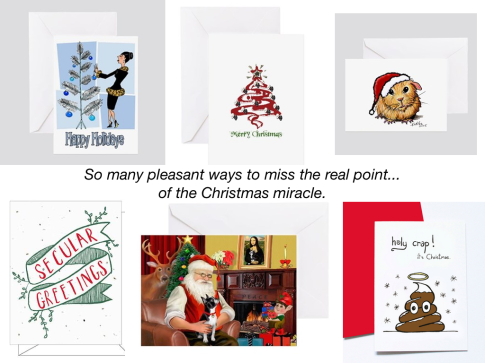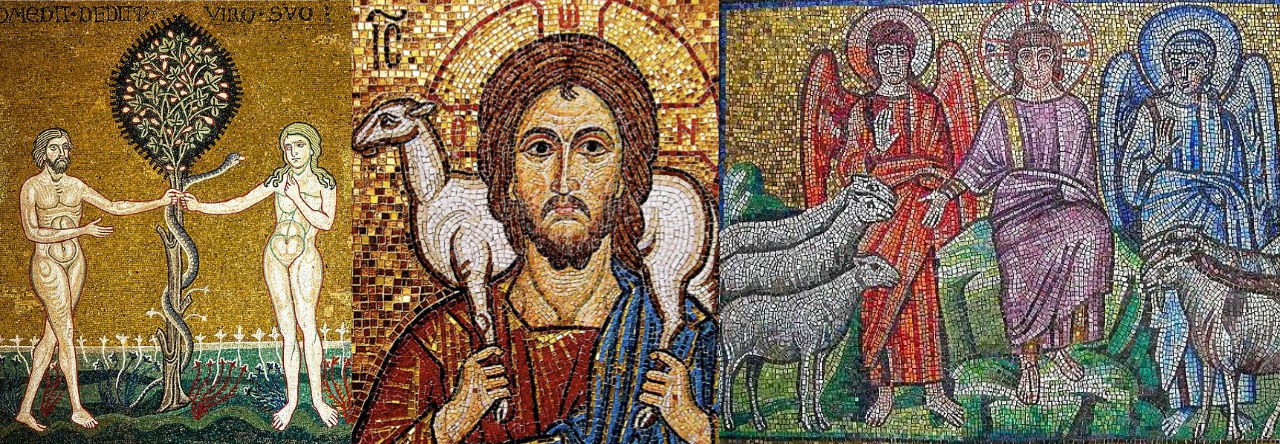
Fortunately, Christmas cards are not yet obsolete. Surely, many have substituted electronic alternatives, but even children of the digital age recognize that a personally scribbled note conveys a rare message—
You are worth the timeit takes me to choose a card, inscribe it, address the envelope and send it on its (dare I say, “merry”) way to you.
This pre-Christmas post is appearing so early because many of us are already addressing our Christmas greetings during the Advent season. And so it goes that Christmas cards and paraphernalia will soon usurp the place of other products in our local stores.
Whether you purchase your cards each winter, or wait until those amazing after-Christmas sales to buy them at 70% off, please keep this advice from C.S. Lewis in mind when you choose them.
Send cards that are appropriate for your recipients.
As a rule, if you are a Christian, you should send a card that celebrates the true meaningof the holy day. Naturally, this can be waived if it would cause genuine offense. However, if someone genuinely practices a different faith, why would you send them a Christmas card in the first place? A Hanukkah card, or a secular New Year’s Day or Thanksgiving seasonal missive would probably be more appropriate.
But my opinion is that for those who would not be overtly offended, a true Christ-mass card is appropriate. After all, many cards are quite gentle and inoffensive. For instance, the genre that picture a star (we recognize that celestial light as a Christian symbol during this particular season), along with words like “may you experience the joy and peace ushered in by this holy season.”
What I would encourage you to avoid sending during this time when we focus on the Incarnation miracle, is the sort of pastoral scenes with their innocuous tidings. For example, the happily sleighing family traveling in a conveyance very few of us will ever see. Send them at some other time, if you will, but they have little or nothing to do with the Nativity.
Now it’s fine if you think I’m old fashioned like the dinosaurs we recently considered.
But if you dismiss my opinion, please consider that of C.S. Lewis.
Lewis’ opinions about the commercialization of the Christmas season are well known, and we have discussed them here at Mere Inkling in the past. He, of course, abhorred the secularization of a sacred event. How sad he would be today to witness how Santa has continued to supplant Jesus.
Some will point out that Lewis himself included Father Christmas in his Chronicles of Narnia. This is true, but it is distinct from the modern secular excesses. In The Lion, the Witch and the Wardrobe, Father Christmas more closely resembles Saint Nicholas, in giving gifts and proclaiming the arrival of the King. It’s not accidental that he begins and ends his visit with the children by pointing to Aslan.
“I’ve come at last,” said he. “She has kept me out for a long time, but I have got in at last. Aslan is on the move. The Witch’s magic is weakening. . . .” Then he cried out, “Merry Christmas! Long live the true King!” and cracked his whip, and he and the reindeer and the sledge and all were out of sight before anyone realized that they had started.
C.S. Lewis was a truly devoted correspondent. He wrote back to the many fans who sought him out, and offered thoughtful responses to even the most frivolous queries. The writing was burdensome, and only the assistance of his brother Warnie for many years kept him from being forced to cease his generous practice.
Some of his correspondents were, or became, his friends. In December of 1955, he thanked one of these for the Christmas card he had sent. The friend was Peter Milward, a Jesuit priest. Lewis’ comments are still timely for Christian readers today.
Thank you for y[ou]r letter of Nov. 17. The enclosed card was one of the v[ery] few I have been pleased at getting.
Christmas cards in general and the whole vast commercial drive called ‘Xmas’ are one of my pet abominations: I wish they could die away and leave the Christian feast unentangled.
Not of course that even secular festivities are, on their own level, an evil: but the laboured and organised jollity of this—the spurious childlikeness—the half-hearted and sometimes rather profane attempts to keep up some superficial connection with the Nativity—are disgusting.
But your card is most interesting as an application of Japanese style to a Christian subject: and, me judice [in my opinion] extremely successful.
I hope you will reflect on Lewis’ thoughts on this subject. Christmas is too precious a time to be “entangled” with secular and pagan baggage.
If you send any holiday communiques—even of a digital nature—choose them wisely.
For more on C.S. Lewis and Christmas, read “A New C.S. Lewis Christmas Gift.”

What a delightful post. (Christmas decorations are already out here – smushed between Halloween, Fall decor with a few turkeys -Pilgrims or Native Americans, a rare sighting)
Free of most of the the business client/customer/supplier obligation for some sort of mailed holiday cards(we always try to be considerate of choices as those a really diverse lot and each have their own celebrations at the same time)
Now the few that get mailed include a small letter or photos – and they send us the same. We caught that now we don’t feel guilty using the same card design from that big box multiple years as it’s stationary no longer a Christmas greetings card. Much more relaxed, enjoyed and appreciated on both ends.
How interesting to read Lewis’ thoughts on the same thing only years before
Thanks for your thoughtful comment. I wrote this with only a personal context in mind, and hadn’t considered the implications of sending holiday cards from one’s business. A very interesting twist which demands much keener sensitivity.
When I shared this draft with my writers critique group last Saturday, the first reaction was–“It’s already too late for this year.” Hearing you say you’re seeing the Christmas decorations already reinforces that concern about how much earlier we “celebrate” each year.
Sadly, by the time Christmas Day arrives, people have Christmas-exhaustion. Thus, they miss the true joy that comes during the brief Christmas Season (of the Church Year) as we reflect on the wonders of the Incarnation.
For many years I made Christmas cards with pictures from relief setttings where I worked – & included updates in the accompanying letter. It was time consuming (taking time to make assemble them & handwrite personal messages on each card) but I also took time to thank God for each friend & pray for them. Now I buy UNICEF & monastery’s cards (for good causes) but still include handwritten notes (& prayers.) blessings & holy-day preparations!!🙏 🎉🌲🎉🙏
I love the witness to the need to care for the less fortunate… and appreciate the reminder of how important it is to pray for others. Praying for them while individually adding personal notes is the perfect occasion for intercession. Blessings to you, as well.
Hi Rob,
They even did a great job of portraying Father Christmas in the Narnia movie. Being true but appropriate for the person is the key, right?
In Christ,
Gary
One of the things that is slightly unsettling to many Lewis fans is his ability to blend together elements from different mythos in telling a “true” story about the gospel. While it is foreign to contemporary evangelicalism, it made perfect sense to him, since all truth is God’s truth, in a sense.
Father Christmas has a valid role in the celebration of Christmas although that has not always been true… nor may it forever remain true.
St. Nicolaus gave gifts to remind people of the real gift of Jesus. Oh how far it has gone.
Pingback: Not Quite Christmas « Mere Inkling Press